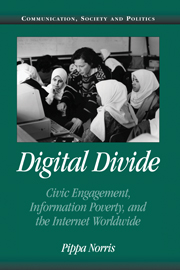Book contents
- Frontmatter
- Contents
- List of Tables
- List of Figures
- Preface
- PART I INTRODUCTORY FRAMEWORK
- PART II THE VIRTUAL POLITICAL SYSTEM
- 5 Theories of Digital Democracy
- 6 e-Governance
- 7 Online Parliaments
- 8 Virtual Parties
- 9 Civic Society
- PART III THE DEMOCRATIC DIVIDE
- Appendix A Nations in the Study and Abbreviated Names Used in Figures
- Notes
- Select Bibliography
- Index
6 - e-Governance
Published online by Cambridge University Press: 05 June 2012
- Frontmatter
- Contents
- List of Tables
- List of Figures
- Preface
- PART I INTRODUCTORY FRAMEWORK
- PART II THE VIRTUAL POLITICAL SYSTEM
- 5 Theories of Digital Democracy
- 6 e-Governance
- 7 Online Parliaments
- 8 Virtual Parties
- 9 Civic Society
- PART III THE DEMOCRATIC DIVIDE
- Appendix A Nations in the Study and Abbreviated Names Used in Figures
- Notes
- Select Bibliography
- Index
Summary
Cyber-optimists are hopeful that the development of interactive services, new channels of communication, and efficiency gains from digital technologies will contribute to revitalizing the role of government executives in representative democracies, facilitating communications between citizen and the state. In contrast, cyber-pessimists express doubts about the capacity of governments to adapt to the new environment. After reviewing theories about these issues, this chapter will examine the evidence and compare the causes and consequences of the rise of e-governance in terms of three core questions:
Where and what type of government departments are online around the globe?
To evaluate the consequences of the rise of e-governance, what are the democratic functions of government websites; in particular how far do they provide transparent information about government activities and opportunities for interactive communication between citizens and the state?
What explains the growth of e-governance and, in particular, how far does democratization drive this process, or is socioeconomic or technological development more important?
THEORIES ABOUT THE IMPACT OF E-GOVERNMENT
Like other political institutions, government departments and official agencies have adapted to the Information Society during the last few years, albeit at a more cautious pace than the private sector. The main potential of digital technologies for government, cyber-optimists suggest, lies in strengthening policy effectiveness, political accountability, and, to a lesser extent, public participation.
- Type
- Chapter
- Information
- Digital DivideCivic Engagement, Information Poverty, and the Internet Worldwide, pp. 112 - 131Publisher: Cambridge University PressPrint publication year: 2001
- 1
- Cited by

